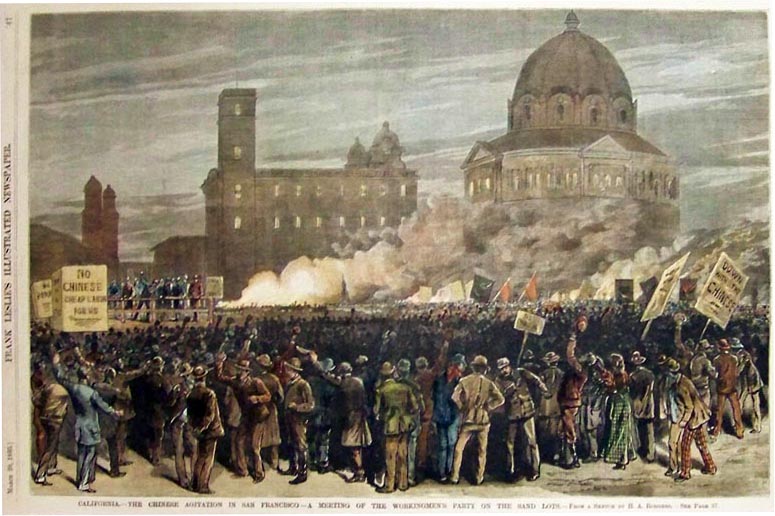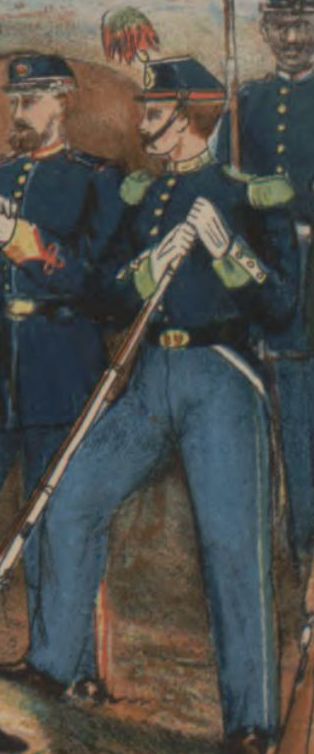In response to a petition signed by fifty-four citizens of San Francisco and in accordance with the laws of the State of California, the Wolfe Tone Guard was organized and mustered in as a unit of the State Militia in San Francisco on the 15 of February, 1862. The company was attached to the 2nd (Irish) Regiment of Infantry, 2nd Brigade. Within a month from the date of organization, the members of the company had equipped themselves with new uniforms consisting of regulation United States Army coats faced with green, red trousers, and regulation hats with green feathers .
On September ninth of that year, they participated in a parade in San Francisco and caused much favorable comment from civilians and military authorities for their spirited, imposing, and soldierly appearance. The company attended the 2nd Brigade Encampment held at Camp Allen, Alameda County in October 1863. This was the largest encampment ever held up to that time, and again the company caused much favorable comment from officials and spectators by their unusual and brilliant appearance, and their skill in executing difficult maneuvers of a military character.
The organization continued to take part in parades and receptions, in fact all public functions where opportunity offered, as well as acting as military escort at inaugural ceremonies. A steady growth was manifested also, the membership having increased to seventy-three in September 1865.
Parades, encampments, and other public appearances occupied the attention of the National Guard in San Francisco from 1871 to 1875. On February 28, 1876, on the occasion of the fire at San Quentin State Prison , the Wolfe Tone Guard and other companies of the Second Brigade were called upon for active service in response to a request from the civil authorities of the State. The conduct of the troops on this occasion was prompt and satisfactory in every respect.

On October 20, 1876, the company was under arms in San Francisco when rioting was feared due to the prevailing feeling against the Chinese in that city. At that time, however, the disturbances did not reach the stage where military aid was required. About the 20th of July, 1877 rioting again broke out in San Francisco. The riots were incited by sympathizers with labor strikers in eastern cities and were directed against the Chinese as before. Fearing that the local authorities would be unable to Quell the disturbance, assistance was asked from the State and the entire Second Brigade was placed under arms ready for action at a moments notice. The troops were placed under arms July twenty-third, but were not called upon until July twenty-ninth and then only for a few hours, as the riots subsided almost immediately after the appearance of the soldiers.
On the Fourth of July, 1877 what was described at the time as the most brilliant parade in which the company had ever participated took place in San Francisco. The entire 2nd Brigade marched in uniform and the Wolfe Tone Guard was as usual one of the most attractive and colorful companies in the line.
During 1878 and 1879, the activities of the company were limited to drill practice and other routine military duties. The company continued to add to its enrollment and in September 1879, the unit numbered eighty-three men. In conformity with the amendments to the military laws of the State enacted at the Legislative session of 1879-1880, the company was reorganized and continued as a unit of the military force of the State.
On June 1, 1881, Company C was consolidated with Company A and the consolidation was redesignated as Company A, 3rd Infantry Battalion. Less than a year later on March 22, 1882, the Third Infantry was mustered out of the service of the State. The Battalion was reorganized and continued as an independent regiment until April 2, 1883, when the regiment was again mustered into the National Guard as the 3rd (Irish) Infantry Regiment. Company C, organized as the Wolfe Tone Guard, reentered the 3rd (Irish) Infantry Regiment as Company E. For further activities of this unit refer to Company E, 3rd (Irish) Infantry Regiment, 2nd Brigade.
1. Adjutant General Report 1865-1867, page 91.
2. For further details refer to Historical Records Second Brigade 1869-1880, page 121. Adjutant General's Office.
